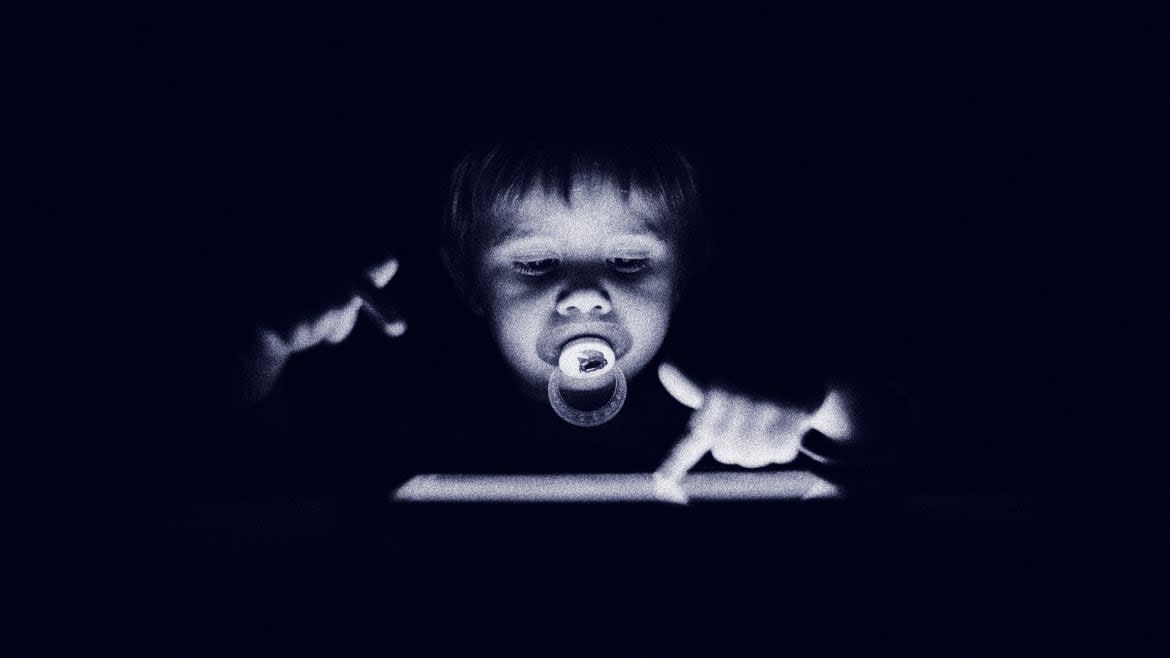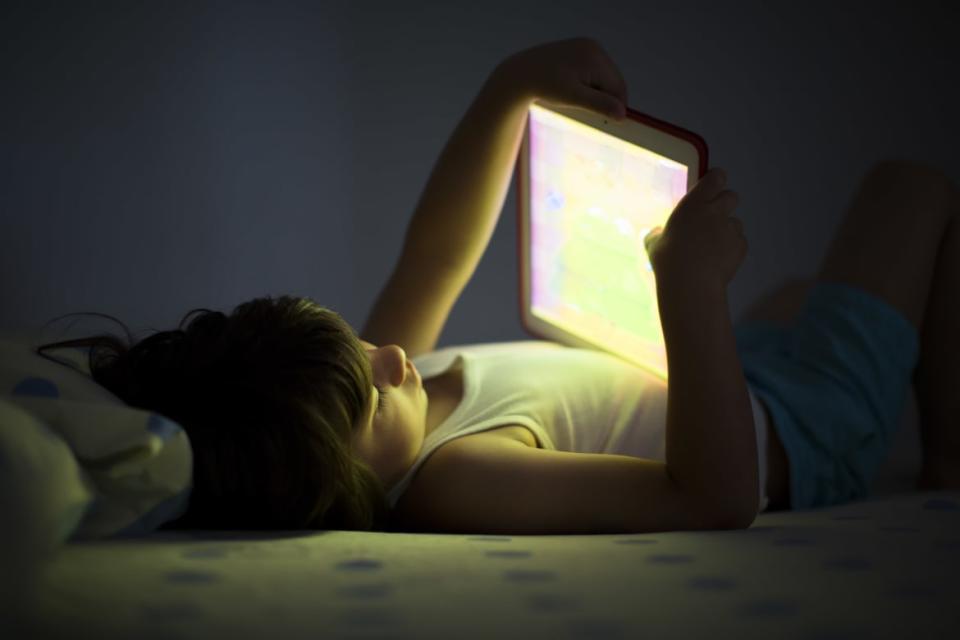Why Gen Z Won’t Be Raising ‘iPad Kids’

As the tween “Sephora kid” epidemic makes headlines, parenting, or the lack of it, has become a larger cultural discourse. While parents have been making socially questionable decisions since the first child was born, these choices didn’t always come with people on the internet judging their every move.
Different renditions of the phrase “I am not raising my kid like that” have plagued the internet since before Sephoragate. These comments usually come from yet-to-be parents and young people who criticize the parenting decisions of older generations. As Gen Z become parents, they’re planning on de-introducing things that millennial and Gen X parents led with—one of the biggest is not raising an “iPad kid.”
The term itself refers to a generation of children born into the boom of smartphones, growing up reliant on technology like touchscreens and constant internet access. While previously a loosely defined term for children who were handed devices in social situations, iPad kids are shifting from parenting to scientific discourse.
In a 2015 study published in the American Academy of Pediatrics (AAP), researchers recruited 350 children aged 6 months to 4years, and looked into just how much exposure they had to mobile devices. Around 97 percent of the sample used tech like smartphones and tablets, with most using them before they turned 1.

Researchers believe that technology like tablets and smartphones may have incredibly harmful effects on children's mental health.
The extent to which children were using them was the largest concern. According to the study, roughly 75 percent of children had their own devices by age 4. By age 2, the authors wrote that they “spent comparable screen time” and were using devices daily. Some researchers have even begun wondering if children might risk addiction to screens.
“Screens or watching television is more related to releasing dopamine and serotonin in your brain, it makes them feel relaxed. In an excessive amount, children might feel addicted,” Salima Kerai, a Ph.D. candidate at the University of British Columbia studying childhood and behavior and different stages of development who was not involved in the AAP study, told The Daily Beast.
“Existing data suggests that particularly passive screen-time viewing is associated with less robust developmental milestone achievements,” Marc Potenza, the Steven Southwick Professor of Psychiatry at Yale School of Medicine and who was not involved in the study, told the Daily Beast. “For particularly early development, infancy period, it is best to not have infants view screens.”
The issue has been growing for years. In a 2020 study into parenting and technology by the Pew Research Center, researchers found that roughly 61 percent of parents of children age 11 or younger received advice or information about screen time from a doctor or other medical professional. The same study also showed the different reactions of parents to a tablet versus mobile devices with 65 percent of parents saying it was acceptable for a child to have their tablet computer before the age of 12—hence Gen Alpha’s “iPad kid” label.
The Luddite Generation
For Gen Z who will soon take the reins of parenthood, shifting away from the iPad trope is the goal—especially in light of the overwhelming negative evidence.
“The generations before me have been too lenient with their kid's screen time since it’s used in a neglectful way,” Ira Jade, a 17-year-old from New York, told The Daily Beast. “Technology is a useful tool but parents have been using them as babysitters for excessive amounts of time every day.”
“I'd equate what is happening right now to parents dropping their kids, who don't know how to swim, in a pool with no help, watching them drown, and then telling them to tread water,” Zion Weeks, a 21-year-old from Delaware, told The Daily Beast.
These conversations go beyond criticism of older generations. Gen Z is slowly shifting away from the technology they were introduced to growing up. A 2023 report by digital marketing site Squarespace surveyed 4000 people, and found that more than 70 percent of Gen Z wanted to disconnect from their phones. In 2023, the “dumb phone” movement inspired by Gen Z increased sales of flip phones, as the generation tried to lessen screen times and revert to the early days of connectivity, one without social media. These “less smartphones” are part of the larger digital detoxing movement amongst Gen Z.
Can a ‘Kosher’ Phone Cure Your Tech Addiction?
At the start of the Pandemic in 2020, Gen Zer Emma Lembke launched The LOG OFF Movement, which aimed to give teens control over their social media usage at the hands of Big Tech. Organizations like LOG off are now working to empower “Youth to tackle the complexities of social media and its impact on younger generations.”
When it comes to parenting, some Gen Z have even created parameters that they intend to set for their kids.
A study conducted by Everyday Health Group Pregnancy & Parenting in 2023 found that Gen Z moms put more emphasis on ensuring tech-free time for children than their Millennial counterparts. With 50 percent of Gen Z moms valuing unplugged time for their children, versus 41 percent of Millennial moms valuing the same thing.
The same study found that 56 percent of Gen Z said they agree with setting screen time limits, as opposed to 50 percent of Millennials.
Jade explains how the appropriate age to give internet access to her child would be around six or seven, even then opting for a website-restricted computer that would have learning or child-safe entertainment. “A handheld device like an iPad or phone shouldn’t be given until teen stages, maybe 15 and up,” she says.
While answers vary from parent, age restrictions are among the biggest ways that the generation plans to regulate screen time.
Weeks shares how he plans to teach his kids media literacy before introducing them to devices. Making sure his kids know how to self-moderate, avoid dangers, and not indulge mindlessly on the internet, is the bigger concern for him. Weeks wouldn’t give his children an iPad or iPhone until 13.
Then there are the rising health concerns. “These devices give you instant, unlimited hits of dopamine. A lot of kids are going to be addicted to their phones at an early age,” Kevin C, a 22-year-old from Texas, told The Daily Beast. “I think kids should be bored sometimes. Boredom can be a good thing as it encourages you to seek out your entertainment.”

Zion Weeks plans to teach his kids media literacy before introducing them to devices.
No iPad Ideology
Of course, these restrictions might be easy to talk about in theory for Gen Zers who don’t yet have kids, but even those who have just entered parenthood talk about what they are already doing to remove prolonged access to screens for their kids.
Theresa Campbell, a 24-year-old from Arkansas, told The Daily Beast that this means putting the “no iPad kid” ideology to practice as she and her husband raise their 1-year-old son Joseph, whose name has been changed to protect his privacy.
“My son Joseph listens to a Spotify playlist we made of children’s songs,” Campbell explained. “He doesn’t have his device.”
Campbell has restricted their son’s usage of devices during social gatherings. Explaining how Joseph is not permitted to use hand-held devices at dinners. This kind of parenting is also facilitated by other adults and children, who help keep their children engaged. “He doesn’t need an iPad to distract him,” she says.
Meet Laika, the Chatbot That Acts Like a Social Media Obsessed Teen
However, this kind of parenting isn't the easiest, especially in a social landscape that is increasingly making hand-held devices the norm for toddlers. For Campbell and her husband, this means intentionally doing activities at their home or friends' houses as opposed to going out since their son isn’t able to sit still for long periods of time. She explains how without a screen he’ll want to run around and be active, which isn't viable at a restaurant.
Sometimes this means setting an example. “My husband and I could improve on not using our devices around Joseph. Even though his access is limited, he is very interested in what we do on our phones and computers. We don’t always set the best example by limiting our usage,” she explains.
For Gen Z, challenging the increasingly digital age of parenting means unplugging for the sake of their children, and it is a tradeoff they are willing to make if it means keeping their digital autonomy. Screen time and device restrictions are just another way Gen Zers hope to stay in control of their children’s well-being, at a time when Big Tech and media corporations in power of every minute spent online.
For them, it’s an act of defiance but also a duty. As Kevin puts it, “It's easy to make fun of the iPad kid, but a lot of it is learned behavior. As adults, we have an even greater responsibility to do something about it. ”
Get the Daily Beast's biggest scoops and scandals delivered right to your inbox. Sign up now.
Stay informed and gain unlimited access to the Daily Beast's unmatched reporting. Subscribe now.


